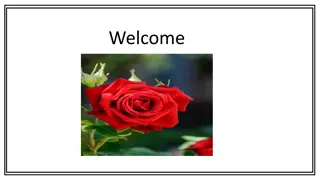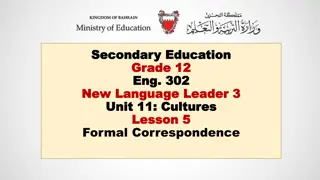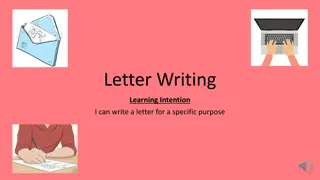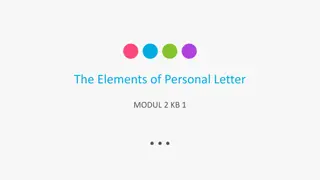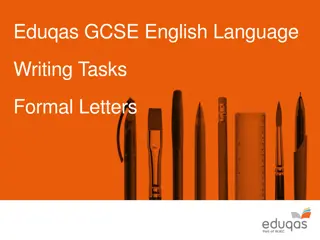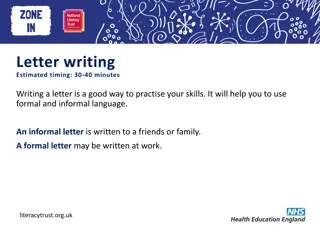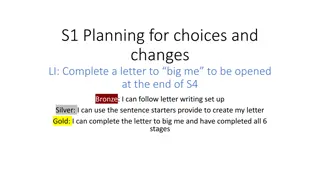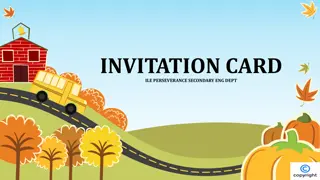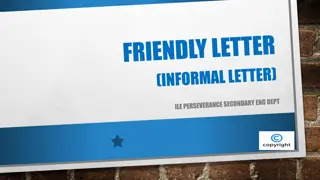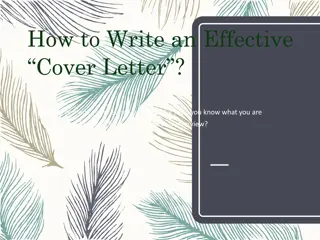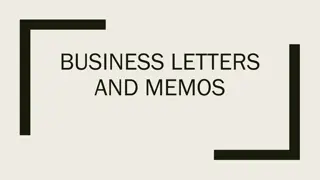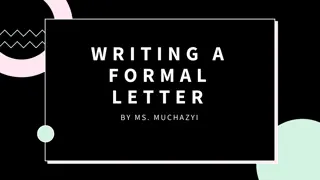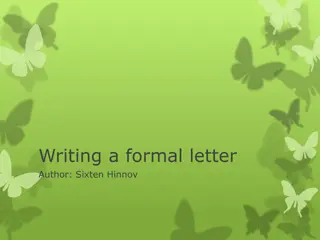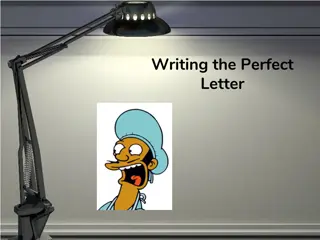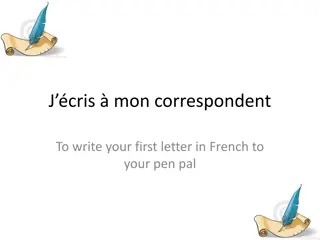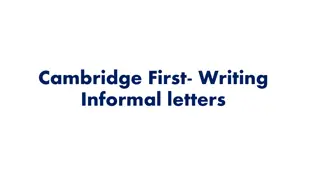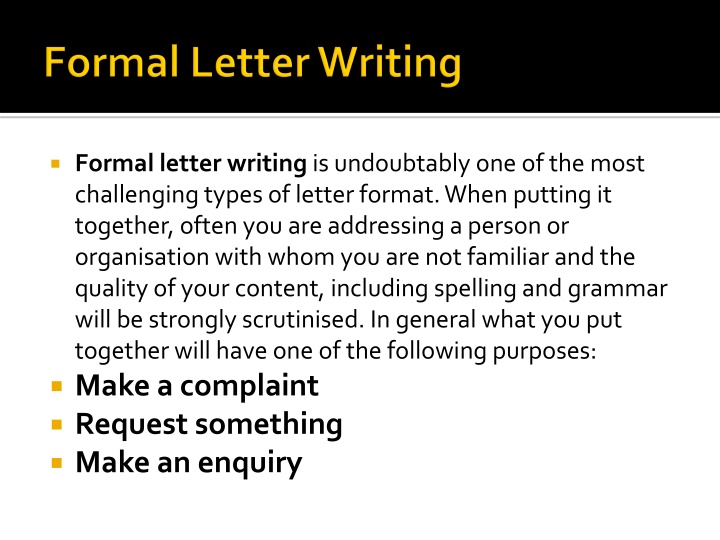
Mastering the Art of Formal Letter Writing
Discover the essential elements of formal letter writing, including proper formatting, addressing, salutations, and conclusions. Learn how to structure your content effectively for making complaints, requests, or inquiries, and elevate your writing skills to impress recipients with impeccable communication.
Download Presentation

Please find below an Image/Link to download the presentation.
The content on the website is provided AS IS for your information and personal use only. It may not be sold, licensed, or shared on other websites without obtaining consent from the author. If you encounter any issues during the download, it is possible that the publisher has removed the file from their server.
You are allowed to download the files provided on this website for personal or commercial use, subject to the condition that they are used lawfully. All files are the property of their respective owners.
The content on the website is provided AS IS for your information and personal use only. It may not be sold, licensed, or shared on other websites without obtaining consent from the author.
E N D
Presentation Transcript
Formal letter writingis undoubtably one of the most challenging types of letter format. When putting it together, often you are addressing a person or organisationwith whom you are not familiar and the quality of your content, including spelling and grammar will be strongly scrutinised. In general what you put together will have one of the following purposes: Make a complaint Request something Make an enquiry
Addresses: 1) Your Address Your address should be displayed in the top right-hand section. This will enable the person that you are writing to, to reply. 2) The Address of the person you are writing to This address should be displayed beneath your address on the left-hand side, remember to include the name of the person that you are writing to (if known).
Date: This should be displayed on the right-hand side of the page on the line beneath your address and should be written in full format: e.g.1st January 2001
Salutation & Greeting: 1) Dear Sirs, If you do not know the name of the person that you are writing to, use the greeting "Dear Sirs,". In some circumstances it is useful to find a name, especially if you are making a request as this will show that you have done your homework and you are more likely to receive a response. 2) Dear MrJones, If you know the name, use one of the following titles: Mr - for a male Mrs - for a married female Miss -for an unmarried female Ms - for a female whose status is unknown or would prefer to remain anonymous Dr - for a person with the status of a doctor This should be followed by the surname only (not the first name).
Concluding: 1) Yours faithfully, If you do not know the name of the person, conclude with "Yours faithfully,". 2) Yours sincerely, If you know the name of the person, conclude with "Yours sincerely,". 3) Your signature Sign your name, then print it underneath the signature. If it is potentially unclear what your title would be then include this in brackets next to your printed name.
Introductory Paragraph The introductory paragraph should be concise and should clearly state the purpose, whether it is to lodge a complaint, make an enquiry or to request something. Main Body The main body should clearly state the points that you want to make. As a general rule it is a good idea to keep this as to the point as possible to ensure that the recipient remains engaged. A longer main body may be more appropriate when making a complaint as you may require to add more detail in order to convey the importance of what you are putting across.
Concluding Paragraph The concluding paragraph should outline what action you would like the recipient to take: to make a refund, to send you information etc.
Application Complaint Aletter of complaint is sent to an individual or organisation in response to receiving poor service or a product that is not fit for purpose. An example of a letter of complaint would be a one sent to a tour operator who has provided a bad service while you have been on holiday This does not necessarily need to be brief as it is important that you detail your arguments and points as much as possible.
Enquiry Aletter of enquiry makes an approach to an individual or organisation either speculatively or in response to printed public domain material whereby you are requesting some information. An example of a letter of enquiry would be one sent to a company requesting a copy of their catalogue or brochure. Short and to the point, it is usually beneficial to include other methods of contact in case the company needs to get in touch with you via other means.
Request Aletter of request is similar to when you make an enquiry asks. An individual or organisation to take an action. An example of a letter of request would be one sent to request sponsorship for a charity activity. It is important to stress the importance of being clear and concise with this format as the recipient must remain engaged and interested in what you have to say.
Your job application letter is an opportunity. Your letter should detail yourspecific qualifications for the position and the skills you would bring to the employer.

